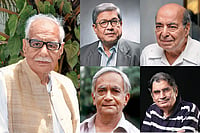IN an incandescent review of Sadhan Kumar Ghose's My English Journey, quite appropriately titled Gosh!, Malcom Muggeridge had written in The New Statesman in 1962 that the last Englishman would be found on the shores of India. It is a remarkable irony that perhaps the last quintessential Bengali bhadralok is alive and well in Oxford, England, at 100! He is none other than Nirad C. Chaudhuri, incorrigible anglophile, dissector of societies and mores, oracle of civilisational decline, biographer, writer of exquisite prose, and Great Polymath.
Niradbabu is not the world's last Englishman—as Ian Jack, the editor of Granta, considers him to be. He, according to Shrabani Basu, Ananda Bazaar Patrika's London correspondent, calls himself "a Bengali and an Englishman". Harish Trivedi, professor of English at Delhi University, also got it wrong when he describes Niradbabu as the "last Bengali babu". 'Babu' applies to lower middle class bhadralok engaged in clerical jobs. Middle, upper middle and upper class members of this status group—landlords, officials or professionals like lawyers and doctors—may be addressed as babus but are classed as bhadralok and not babus.
In my view, Niradbabu belongs to the front rank of the superior bhadralok. The latter, a product of the Bengal Renaissance triggered by the province's encounter with the West in the 19th century, absorbed and internalised the European experience in the light of their own genius. The process continues in Niradbabu, powered by his stupendously energetic intellect.
Whatever identity one confers on Niradbabu, a celebration is in order when a person of his intellectual vitality completes five scores of years on this earth. The volume is meant to be that. It is a collection of pieces, some comprising mainly of reminiscences and anecdotes, and others focussing primarily on his work. Meenakshi Mukherjee, distinguished academic, provides the only exception. Her contribution reflects his known partiality toward women and proneness to flirt impishly and play the gallant. One sees a bit of that also in the piece by Amita Malik, who recalls her encounters with him and his family, his scholarship and the persecution he suffered because of his views.
Niradbabu's deep bonds with his wife, Amiya, and the grief that enveloped him on her passing, is touchingly etched by Shrabani Basu. Krishna Bose, his niece, who is also a professor of English, presents charming vignettes of her uncle in the setting of their family in her growing years. His contempt for the educated anglicised Bengalis is brought out by Khushwant Singh who also provides glimpses of his sensitiveness, self-respect, uncompromising integrity, and delight in provoking people.
Ian Jack presents the awe-struck-Brit's eye view of this strange phenomenon from Bengal, a partial atavistic throwback on an extinct species—the Victorian English gentleman—who is quite unhappy with many things British. The latter, as Natwar Singh, retired diplomat and former Union minister of state, shows, includes E.M. Forster. Recalling his long association with Niradbabu, Singh mentions how he made available to him a rare book, Sujan Charita, from the Bharatpur family. He also mentions how, at his instance, Chatto and Windus published Thy Hand, Great Anarch! sans the massive cuts they had suggested earlier, and Oxford University conferred upon him the honorary degree of Doctor of Letters. William Radice, known for his translations of Tagore's poems into English, gives an interesting account of his meetings with Niradbabu. One, however, expected some comments on Niradbabu's works in Bengali, particularly since he states that "a growing awareness of Nirad Babu" was "a significant influence" on his decision to learn Bengali.
The general tenor of the contributions is appreciative but by no means hagiographic. Nabaneeta Dev Sen, poet and writer, shows some of the warts in Niradbabu's psyche. Nor are punches pulled by English poet K.N. Daruwalla and Trivedi, who dwell mainly on Niradbabu's work. The former is critical of Niradbabu's attitude towards Buddhism and the caste system, view of Sikhs as a militant segment of Hindus, articulation of "the most stereotypical racial prejudices". Yet, he concludes by saying that one cannot deny the originality of his views, "his quicksilver mind and the passion and the integrity behind his sweeping denunciations". But Trivedi trips up when he translates atmaghati Bengali and atmaghati Rabindranath as 'self-destructive Bengalis' and 'the self-destructive Tagore'. The correct translation is 'suicidal Bengalis' and 'suicidal Rabindranath'.
Swapan Dasgupta's introduction is extremely well-written. He deftly places Niradbabu in his cultural and historical context and shows that his views on the British empire echo "the conventional wisdom of his childhood in Bengal". Dasgupta also shows that Niradbabu's statement that the destruction of the Babri Mosque in 1992 was a Hindu answer to centuries of Muslim vandalism, did not reflect a desire to jump onto the BJP's bandwagon but was consistent with the position he had taken in his book on Hinduism published in 1979.
However, the name 'Nirad' and the honorific suffix 'babu' appear as two words throughout. In Bengali, they form one word: Niradbabu. Besides, no piece refers to Niradbabu's writings in the Bengali journal Sama Samayik which were widely noted. Nor has any contributor seen him as what he is at the core—an archetypal outsider prone to be alienated from any environment he finds himself in. Rejecting Bengal and India, he went to Oxford only to be disillusioned by what he perceived to be Britain's degeneration. All this is partly due to his being a Bhadralok, torn between Bengali and Western culture, unable to identify with either. This has been aggravated by his role as dissector of societies and cultures that's made Niradbabu an intellectual Ulysses on a perennial voyage of scrutiny.























